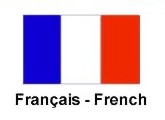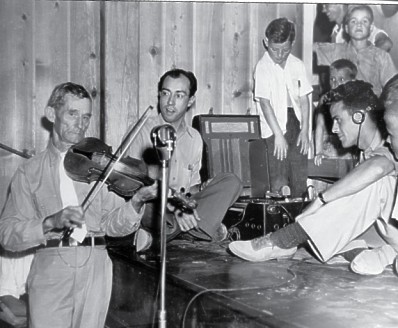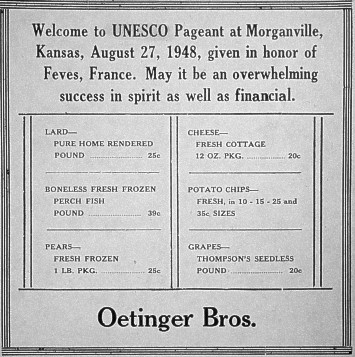Todd's letter doesn't reveal the long relationship he had with Sonkin. Meeting in graduate school, both became
professors at the City College of New York. They spent long periods together during the Depression
years in the Arvin, California migrant camp making over 500 folk-song recordings for the Library of Congress
of the "Okies" from Oklahoma and "Arkies" from Arkansas. In New York, they became friends with Pete Seeger, Woody
Guthrie, Ethel Merman and others in the entertainment business. In 1942, legendary blues guitarist Huddie William
"Lead Belly" Ledbetter recorded a song called "Todd Blues" about how sad he, his wife and Sonkin were because Todd was
leaving for California to manage a migrant camp.
Camp recording by Sonkin, second from left,
Todd far right
As the day of the fete approached, activities in Morganville became a bit more hectic. Trips were made to
Manhattan and Concordia to procure various items, such as ribbon and flowers for decorations, cardboard for signs,
a large map of the Metz area to show where Fèves was located and pieces of clothing to complete costumes.
On Friday morning, Main Street was roped off. Flags of many nations were hung, created in the village with rags women
had dyed. There was a bulletin board with information about Fèves. Visitors would be able to buy cookies made from family
recipes of German, French, Swedish, and Norwegian settlers of the Morganville area.
Advertisement for Oetinger Brothers' grocery store
A reporter from The Day, a New London, Connecticut newspaper, came to Morganville to learn about this small village on the Kansas prairie named after one of their own, whaling captain Ebenezer Morgan.
Capt. Ebenezer Morgan, one of the great figures in New London whaling history, is commemorated in a pageant ...
with which Morganville, Kans., is observing its adoption of the farming community of Feves, France.
Morgan, the founder of the Kansas town with a population of 200, is regarded as an almost legendary character there.
He went to Kansas in 1870, soon after retiring from the sea, staked a claim and bought an 800-acre cattle ranch.
The old whaling captain's experience as a rancher fits well into the theme of the pageant, entitled One World or
None. Morgan, who dreamed during years at sea of "getting away from the world" on a wild west cattle ranch,
found he couldn't do it.
So he returned to spend his declining years in the east. But when he left Kansas, he donated his ranch as the
townsite of Morganville.
His biography indicates that Morgan, like the town he founded, was small of stature but great of heart. He was born
in Boston in 1817, orphaned young and signed aboard a whaler as a cabin boy at the age of ten. When he died in 1890,
he left an estate worth close to a million dollars - and the dollar was worth 100 cents then, not 40 as now.
He became a master at 21, and during the 41 years he spent at sea, he made many successful voyages, almost all from
this port.
Alexander Starbuck's authoritative volume on the American whaling industry credits Morgan with the "best voyage
on record." This was a cruise in 1864-65 in the Pioneer, which brought back 1,391 barrels of whale oil and 22,650
pounds of whalebone, yielding a profit of $114,000 on a $36,000 investment. The Pioneer, incidentally, was the first
steam whaler fitted out in the United States.
In connection with the "One World" pageant honoring his memory, it is notable that Morgan was one of the first to
profit through a Russian-American agreement of his own day: In 1867, Russia ceded Alaska and its outlying islands
to the United States. And in the following year, Morgan was the first to plant Old Glory on Alaskan soil - on a
trip from which he returned with 45,000 sealskins.
And in his old age, when neither of his two sons could climb the flagpole in his back yard in Groton to set the
halyards straight, Morgan gave them a disgusted look, whipped up the pole and fixed the ropes himself.
A reporter from The Topeka State Journal also visited Morganville for a story in its paper. The article was apparently written the day of the pageant as Sonkin is quoted as having seen the rehearsal, but it appeared in the Friday paper. It gives a glimpse into what was planned.
Newspaper headline
When Morganville (pop. 243) votes for One World, there's One Town behind it. Three-fifths of its citizens will take part in a
pageant in the open-air town forum Friday at 8 p. m. to celebrate Morganville's adoption of the French town of Feves.
Almost everybody else in town will contribute something to the program of square dancing, European native songs and dances, and
children's horse rides at "ten sous" instead of ten cents a ride. Cookies baked from old family recipes handed down from Swiss,
German, French and other foreign ancestors will be on sale.
Robert Sonkin, New York City college speech instructor, is in Morganville to represent Operation Democracy, the
organization that helped the Kansas town select the French community it would sponsor.
"I saw the dress rehearsal of the pageant Thursday night," he said Friday, "and it's perfectly wonderful.
"It tells the whole history of Morganville, with the object of explaining to the people of Feves,
'We endured hardships too. We knew hunger and suffered to build this land of plenty. But we came thru and there is
hope for you in our story.'
"Miss Velma Carson, a member of Morganville's UNESCO committee, wrote the pageant. The pioneers will appear in a
covered wagon built by Mr. Herman Merten. Mrs. Velma Young, a school teacher, is the program director. Mrs. Agnes
Anderson, a housewife, is the narrator.
"After the early hardships of the pioneers come the arts of peace. A Greek dance represents the influence of the
classics on local life. Then the outside world begins to intrude. Morganville's sons go off to wars overseas. [We
see a woman representing] the world ... turning a great globe in search of her lost children. An American angelus
and a French angelus are depicted together, the French poverty-stricken and the American with a full harvest. The
American woman asks 'How can we be satisfied knowing there are empty baskets in other parts of the world?'
"Finally, the whole company, in costume, sings a song, 'One World,' and the Rev. H. E. Millikan, Methodist minister,
a World War II chaplain, will speak a brief prayer in French."
An ice cream social to follow the pageant will be organized by Mrs. Alice Berggen Oetinger. Congratulatory telegrams are
expected from Mr. Henri Bonnet, French ambassador in Washington, D. C., Mr. V. Iala [sic - J. J. Viala], French consul
general in Chicago, and President Milton Eisenhower of Kansas State College.
Mr. Sonkin will record the whole program for transmission to France over the New York World Radio University station
WRUL. He said Morganville was the first Kansas town, and the smallest town anywhere, to seek adoption of a French
town thru his organization. Neosho county had adopted Zevenbergen, Holland. So many United States communities had
wanted to adopt towns in other parts of the world that "Operation Democracy," a non-profit organization, has been
founded as a clearing house.





